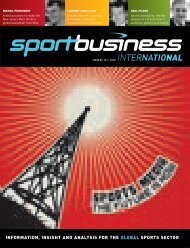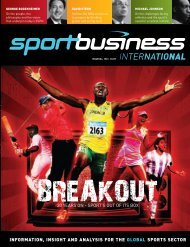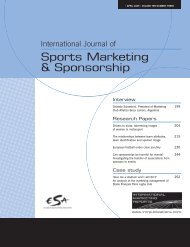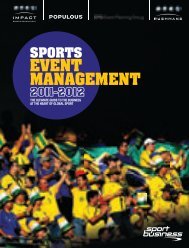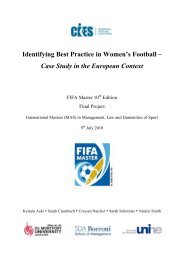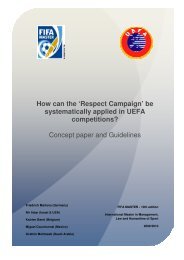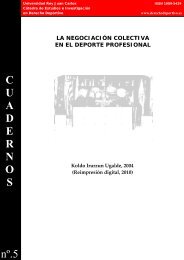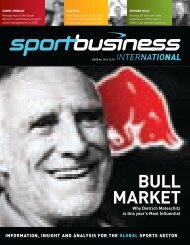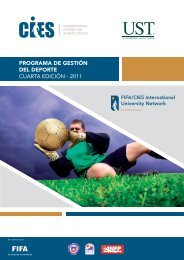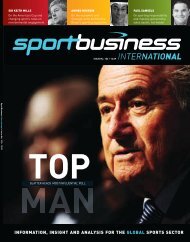4 - FIFA/CIES International University Network
4 - FIFA/CIES International University Network
4 - FIFA/CIES International University Network
You also want an ePaper? Increase the reach of your titles
YUMPU automatically turns print PDFs into web optimized ePapers that Google loves.
INTERNATIONAL FOCUS<br />
NORDIC REGIONS<br />
Swedish tennis star Robin Soderling - Getty Images Sport<br />
companies launching commercial TV services<br />
into the Scandinavian space. So starting in the<br />
late 1980s, the result was a wave of free-to-air<br />
and subscription launches via satellite, many of<br />
which were based beyond the borders of local<br />
governments (thus evading regulatory controls).<br />
Critical to understanding today’s rights market<br />
is the fact that those which survived now operate<br />
across the entire Nordic space - offering a mosaic<br />
of pan-regional and territory-specific services.<br />
The classic case is Modern Times Group,<br />
which offers both wholly-owned and third party<br />
channels via its Viasat direct-to-home satellite<br />
platform. MTG constantly finesses its channel<br />
portfolio to maximise performance. But in its<br />
current incarnation it has a pan-regional golf<br />
channel (Viasat Golf), two Swedish sports<br />
channels (Viasat Sport Sweden, Viasat Fotball),<br />
two Norwegian sports channels (Viasat Sport<br />
Norge, Viasat Fotball) and two Danish sports<br />
channels that it runs in partnership with publicservice<br />
broadcaster TV2 (having previously<br />
operated its own sports channel).<br />
To complicate matters further, MTG has two<br />
channels airing across Norway and Sweden<br />
(Viasat Motor & Viasat Sport HD). The upshot is<br />
that MTG - which also has free-to-air networks<br />
(more of which later) - can be a buyer of both panregional<br />
and territory-specific rights - depending<br />
on a) its own needs and b) the competition.<br />
The situation is broadly the same with MTG’s<br />
major rival C More Entertainment, which runs<br />
Canal Plus-branded pay-TV services across<br />
Scandinavia (though Canal Plus itself is no longer<br />
part of the platform’s ownership structure).<br />
New player on the scene<br />
The ownership history at C More is complex,<br />
but the business today belongs to Swedish<br />
media giant TV4 in partnership with Norway’s<br />
Telenor, which acquired 35 per cent of the<br />
business in May. This joining of forces is<br />
expected to make C More a stronger player in<br />
the Nordic sports TV market.<br />
Aside from the fact that it brings various<br />
Telenor rights into the Canal Plus line-up, C More<br />
also used the merger to announce an expanded<br />
sports content offering. In particular, it outlined<br />
plans to add football from La Liga, Serie A and<br />
Major League Soccer in the US; basketball from<br />
the NBA; and Swedish ice hockey.<br />
As with MTG, the fact that TV4 also has<br />
a powerful Swedish-based free-to-air network<br />
(as well as a free-to-air sister service in<br />
Finland) means it is looking for both territoryspecific<br />
and pan-regional sports rights.<br />
Furthermore, Telenor is a major crossplatform<br />
operator which means there is also a<br />
compelling need for rights which cover digital<br />
platforms such as mobile.<br />
All major football rights holders (<strong>FIFA</strong>,<br />
UEFA, national leagues) are faced with this<br />
kind of market complexity (see box) when<br />
dealing with the Nordic region. So it’s perhaps<br />
not a surprise to see that rights agencies have a<br />
prominent role. For UEFA, rights are managed<br />
by long-term partner TEAM - while emerging<br />
Swiss outfit Kentaro made a big splash in the<br />
market when it snapped up Norwegian Football<br />
Association and Swedish Football Association<br />
rights in 2006 (previously broadcasters dealt<br />
directly). Also worth noting is that Lagardere is<br />
active via its 2007 acquisition of Sweden-based<br />
agency IEC in Sports.<br />
Perhaps most significant has been the<br />
arrival on the scene of Medge Consulting, a<br />
start-up agency which secured all Nordic rights<br />
to the English Premier League in December<br />
COMPLEX TV SCENARIOS<br />
The Nordic TV market results in some<br />
complicated rights scenarios - particularly<br />
in football, which, as in the majority<br />
of European TV markets, is the most<br />
in-demand sport. This is evident in the<br />
case of UEFA - which has a variety of<br />
deals for the Euros, the Champions<br />
League and the Europa League. The most<br />
straightforward is UEFA’s partnership<br />
with MTG for the Champions League -<br />
which the broadcaster controls exclusively<br />
in Denmark, Norway and Sweden across<br />
both free-to-air and pay-television.<br />
However it’s worth noting that in Finland<br />
MTG shares rights with YLE. The situation<br />
with UEFA’s Europa League (2009-2012)<br />
is more complex - since MTG has rights<br />
in Denmark and Norway while TV4 has<br />
Sweden. In both cases, the deals allow<br />
the broadcasters to air games on free and<br />
pay-TV channels.<br />
This can lead to unusual scenarios. In<br />
Denmark, for example, the first-choice<br />
live match airs on MTG’s TV3+ - a rival to<br />
TV2. However other live matches air on<br />
TV2 Sport - the joint-venture between the<br />
two [Note - you get a similar situation<br />
with Danish Superliga football which airs<br />
on TV3+, TV2 Sport and Canal 9, a pay-TV<br />
channel which belongs to TV4]. Further<br />
evidence of the Nordic market’s complexity<br />
comes in the case of UEFA’s Euro 2012<br />
rights - which were recently licensed to<br />
TV4 for Denmark and Norway as well as<br />
its home market Sweden. In Sweden, TV4<br />
is sharing the rights with SVT while in the<br />
other markets it is effectively acting as a<br />
sub-agent - dividing up fixtures between<br />
its own channels and third parties in order<br />
to give UEFA the optimal mix of free and<br />
pay-TV coverage.<br />
SportBusiness <strong>International</strong> • No.160 • 09.10 75



